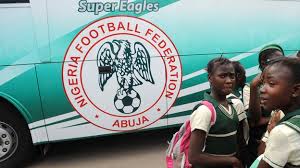By Mark Baber
December 18 – Barrister Leo Iyke Igbokwe, one of the aggrieved losing candidates in the disputed September 30 elections which saw Amaju Pinnick win the Presidency of the Nigerian Football Federation (NFF), told journalists Tuesday that if FIFA did not annul the elections within three days, he would take the matter to court.
According to Igbokwe: “FIFA approved the NFF Statutes. They were reported to have written the letter. I appreciate they were misinformed. I have written a petition to correct the anomaly. They have all the facts now. They have the room to correct themselves or we proceed to the next level.”
Igbokwe pointed out that he had “gone through all the football structures for arbitration as it is in the Statutes. Now, I may be forced to go to court. FIFA has to defend how they reached the decisions they took whether it is in tandem with the same statutes they approved for the NFF to follow.”
FIFA wrote a letter the NFF, effectively accepting the decision of the “majority” of the NFF Electoral Appeals committee, after members of the committee chose to rebel against their chairman and turn down the appeals against the election of Pinnick on a number of highly disputed, poorly explained and largely procedural grounds.
According to Igbokwe, the rebels on the committee had no right to issue their “Press Statement” which FIFA erred in accepting having been “deceived” by the NFF hierarchy.
Apparently stunned by FIFA’s acceptance of the NFF hierarchy riding roughshod over their own regulations, Igbokwe pointed out that the NFF Electoral code Article 12(1), which set up the Elections Appeal Committee, stipulated there should be three members. One of the signatories of the “majority decision” was suspended as an interested party, so only one legitimate member (and two substitute members with no voting rights) had signed the release – and this view should not have been upheld against the report of the committee chairman.
Igbokwe attacked the incongruity of the announcement of the “majority decision” by the NFF, the body which was itself under scrutiny, and the fact those signing the decision were not lawyers – calling this an “insult to lawyers in Nigeria,” and saying “I will sue FIFA. We are not a lawless nation.”
There is, of course, plenty of blame to be handed out in the ongoing Nigerian football governance crisis. If FIFA’s interventions were meant to support FIFA or NFF regulations, a fair and free election process, to stymie governmental interference, or encourage non-discrimination and good governance they can hardly be judged a success.
It remains to be seen if FIFA will back down from their support of the currently ruling faction, or if Igbokwe’s faith in the Nigerian legal system proves justified; but it is highly unlikely the current hierarchy will surrender power or submit themselves to a new electoral process willingly, whatever the long-term consequences for Nigerian football.
Contact the writer of this story at moc.l1751757965labto1751757965ofdlr1751757965owedi1751757965sni@r1751757965ebab.1751757965kram1751757965

